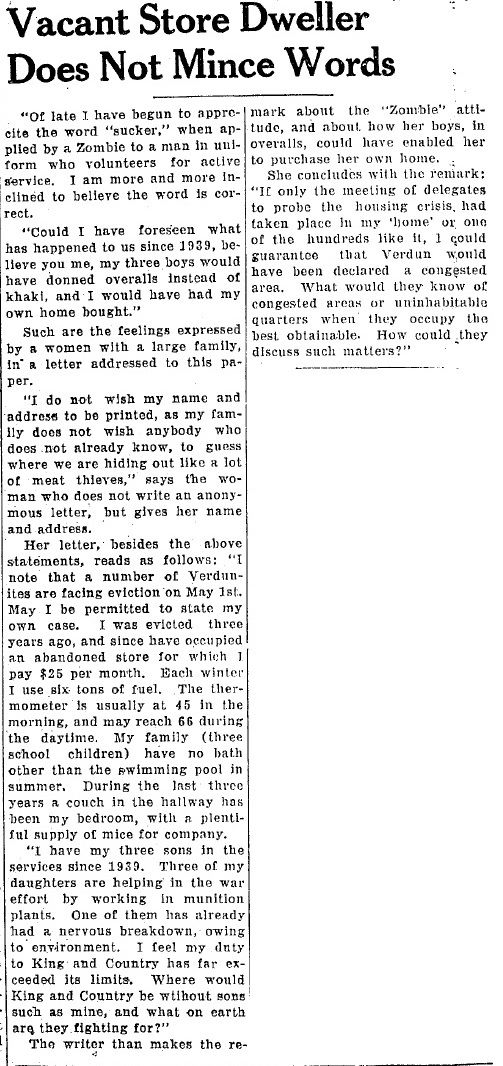A Letter Revealing a Major Crisis

Date: February 15, 1945
Source: The Guardian / Verdun Borough Archives
This reproduction of a letter written by a Verdunite evicted from her flat in 1945 clearly illustrates the devastating effect of the housing crisis and the frustration it caused in the community, particularly among servicemen and their families. This mother of three soldiers, all in service, explained that her family had had to live for the last three years in a cold vacant store, with no closed off rooms and nowhere to wash.
Transcription:
Vacant Store Dweller
Does Not Mince Words
“Of late I have begun to appreciate the word “sucker,” when applied by a Zombie to a man in uniform who volunteers for active service. I am more and more inclined to believe the word is correct.
“Could I have foreseen what has happened to us since 1939, believe you me, my three boys would have donned overalls instead of khaki, and I would have had my own home bought.”
Such are the feelings expressed by a women with a large family, in a letter addressed to this paper.
“I do not wish my name and address to be printed, as my family does not wish anybody who does not already know, to guess where we are hiding out like a lot of meat thieves,” says the woman who does not write an anonymous letter, but gives her name and address.
Her letter, besides the above statements, reads as follows: “I note that a number of Verdunites are facing eviction on May 1st. May I be permitted to state my own case. I was evicted three years ago, and since have occupied an abandoned store for which I pay $25 a month. Each winter I use six tons of fuel. The thermometer is usually at 45 in the morning, and may reach 66 during the daytime. My family (three school children) have no bath other than the swimming pool in the summer. During the last three years a couch in the hallway has been my bedroom, with a plentiful supply of mice for company.
“I have my three sons in the services since 1939. Three of my daughters are helping in the war effort by working in munition plants. One of them has already had a nervous breakdown, owing to environment. I feel my duty to King and Country has far exceeded its limits. Where would King and Country be without sons such as mine, and what on earth are they fighting for?”
The writer than makes the mark about the “Zombie” attitude, and about how her boys, in overalls, could have enabled her to purchase her own home.
She concludes with the remark: “If only the meeting of delegates to probe the housing crisis had taken place in my ‘home’ or one of the hundreds like it, I could guarantee that Verdun would have been declared a congested area. What would they know of congested areas or unthinkable quarters when they occupy the best obtainable. How could they discuss such matters?”

